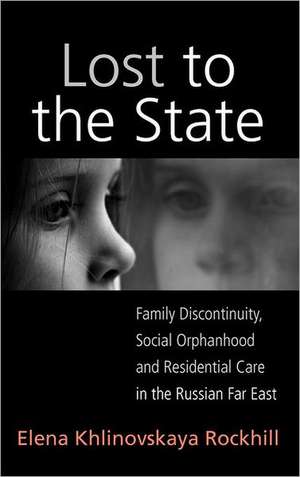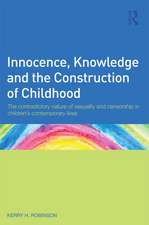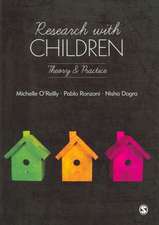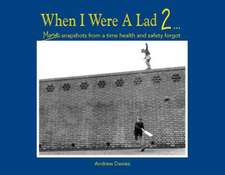Lost to the State
Autor Elena Khlinovskaya Rockhillen Limba Engleză Hardback – 20 dec 2010
Elena Khlinovskaya Rockhill was born in Russia and first trained as a Biologist. In 2004 she received her Ph.D. in Social Anthropology from Darwin College, Cambridge University. From 2004-2007 she worked as a Research Associate at the Department of Social Anthropology, Cambridge University. She was a 2007 Wenner-Gren Hunt Postdoctoral Fellow, and a PI for an ESF-funded international project 'Moved by the State: Perspectives on Relocation and Resettlement in the Circumpolar North' at the University of Alberta, Canada (2007-2010).
Preț: 748.01 lei
Preț vechi: 869.78 lei
-14% Nou
Puncte Express: 1122
Preț estimativ în valută:
143.14€ • 147.89$ • 119.07£
143.14€ • 147.89$ • 119.07£
Carte disponibilă
Livrare economică 26 februarie-12 martie
Livrare express 12-18 februarie pentru 38.79 lei
Preluare comenzi: 021 569.72.76
Specificații
ISBN-13: 9781845457389
ISBN-10: 1845457382
Pagini: 336
Dimensiuni: 156 x 234 x 22 mm
Greutate: 0.74 kg
Editura: BERGHAHN BOOKS INC
ISBN-10: 1845457382
Pagini: 336
Dimensiuni: 156 x 234 x 22 mm
Greutate: 0.74 kg
Editura: BERGHAHN BOOKS INC
Cuprins
List of Figures and Tables Acknowledgements Notes on Transliteration List of Acronyms and Abbreviations Introduction The Scope of the Problem What is this Study About? Time Line: Soviet and Post-Soviet Notes on Methodology Theoretical and Conceptual Framework PART I. BECOMING A SOCIAL ORPHAN Chapter 1. A Brief History of Family Policy in Russia Pre-Revolutionary Shelters and the Concept of the Child The Soviet Period: Family Discontinuity and Children-out-of-Family Chapter 2. The State as a Co-Parent Fieldsite: Magadan The Child Welfare Network Residential Care Institutions and their Functions Categories of the Family The Benevolent State and 'Good' Parents: Voluntary Placements and Cooperation Chapter 3. State and Family: Tilting the Balance of Power Neblagopoluchnye Parents: Tension between the State and the Family 'Inadequate Fulfilment of Parental Duties' Working with the Neblagopoluchnaya Family Chapter 4. Parents Overwhelmed by the State 'Child Appropriation': The Case Study of Maria Court Hearings Deprivation of Voice and Disempowerment of the Parent Chapter 5. Norms and Deviance The 'Best Interests of the Child': Moral Judgement of the Parent The Child's Biological Family: The Severance of Ties and 'Symbolic Death' of Parents The Construction of Family by the State: A Society of Virtual Kin PART II. BEING A SOCIAL ORPHAN Chapter 6. The State as a Sole Parent The Rake's Progress: The Child's Journey through Residential Homes The Cosmology of Institutions Chapter 7. The World of Social Orphans Experiencing Institutions: Narratives of Former Inmates Misha's Signposts of Institutional Life Unpacking Parent-Child Obligations: Dispersed Responsibility and Accountability Two Worlds: Orphans and the Wider Society PART III. POST-SOVIET OR SOVIET? SELF-PERPETUATION OF THE SYSTEM Chapter 8. The Continuing Soviet Legacy: Paradoxes of Change and Continuity Childhood and Family Today: The Shifting Domains of Public and Private Continuity of Practices and Attitudes 'Moral Panic': Current Descendants of Witchcraft Accusations and Show Trials Self-Perpetuation of the System Alternative Approaches Chapter 9. The Post-Soviet Case in a Wider Context Conclusion Modes of relatedness Power Asymmetry Appendix 1. List of Documents Supplied to the Court by the Guardianship Department and the Baby Home in Maria's Case Appendix 2. Reminiscences of Two 'Bad' Childhoods References Glossary Index
Notă biografică
Elena Khlinovskaya Rockhill was born in Russia and first trained as a Biologist. In 2004 she received her Ph.D. in Social Anthropology from Darwin College, Cambridge. In 2004-2007 she worked as a Research Associate at the Department of Social Anthropology, Cambridge University. She is a 2007 Wenner-Gren Hunt Postdoctoral Fellow.
Recenzii
This study is extremely well done; a fluently written, scholarly account and analysis that provides a necessary addition to the 'post-Soviet' literature, which has few such sharp analyses of the family, not least because the author takes on relevant debates and histories that both add considerable depth to this discussion and widen the applicability of the primary focus. Thus, we are given a marvellously careful and detailed insight into the workings of a provincial bureaucracy still shaped by the mores and customs of a Soviet bureaucracy but now faced with the sharply different context of the post-Soviet world.A" Catherine Alexander, Goldsmiths College, London











